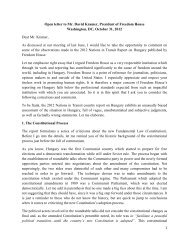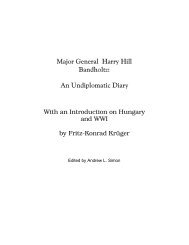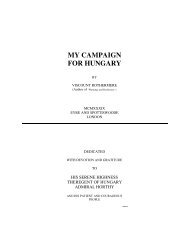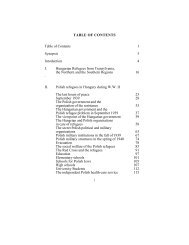The Fate of Western Hungary 1918-1921 - Corvinus Library ...
The Fate of Western Hungary 1918-1921 - Corvinus Library ...
The Fate of Western Hungary 1918-1921 - Corvinus Library ...
You also want an ePaper? Increase the reach of your titles
YUMPU automatically turns print PDFs into web optimized ePapers that Google loves.
<strong>The</strong> reasons for the minuscule military strength <strong>of</strong> <strong>Western</strong> <strong>Hungary</strong> go back<br />
six months. Of them, the most important: Károlyi and his government’s<br />
restrained – and blind trust in the Entente Powers’ promises – behavior, the<br />
unwise disarming <strong>of</strong> Hungarian military units returning from the eastern and<br />
Italian fronts, the blameworthy neglect to organize national self-defense, the<br />
deliberate obstruction <strong>of</strong> armed resistance. In other words, the imprudent and<br />
evil policy <strong>of</strong> voluntary surrender. On top <strong>of</strong> it, Károlyi fell for the siren song <strong>of</strong><br />
Wilsonism, – which had no more effective meaning for <strong>Hungary</strong> – the fevered<br />
dreams <strong>of</strong> pacifism and the fruitless quagmire <strong>of</strong> the exchange <strong>of</strong> diplomatic<br />
notes <strong>of</strong> the Paris Peace Conference and the Entente Powers.<br />
What was the number <strong>of</strong> Hungarian soldiers returning from the fronts in the<br />
Fall <strong>of</strong> <strong>1918</strong>? With the authorization <strong>of</strong> the Károlyi government, Béla Linder<br />
(1876–1962), Minister for War, issued an order on November 1 – while the<br />
truce terms were being negotiated in Padua between the Monarchy and the<br />
Entente – to all the Hungarian forces on all the fronts to lay down their arms.<br />
He did this two days before the truce agreement was signed (Nov. 3), making<br />
the armed defense <strong>of</strong> <strong>Hungary</strong> impossible! With this order, Prime Minister<br />
(later president <strong>of</strong> the republic) Károlyi, his Minister for War, Linder, and after<br />
November 4, the Undersecretary responsible for disarmament, Vilmos Böhm<br />
(1880–1949) and their circle, are guilty <strong>of</strong> treason against the country and the<br />
nation for ignoring Hungarian national interests. <strong>The</strong>y failed to organize<br />
defenses against the Czech-Slovak, Romanian and Serb forces that broke into<br />
the country. Serving foreign interests, they deliberately disarmed and<br />
demoralized the returning units from the fronts, from the beginning <strong>of</strong><br />
November to the end <strong>of</strong> December <strong>1918</strong>. <strong>The</strong> returning army was mostly in<br />
orderly units, under the command <strong>of</strong> <strong>of</strong>ficers, carrying their weapons and<br />
artillery. Böhm, in his biography, disclosed the following numbers: “By the end<br />
<strong>of</strong> November (<strong>1918</strong>), almost 700,000 soldiers were demobilized, by the middle<br />
<strong>of</strong> December, their number reached 1,200,000. Total demobilization was<br />
completed by the end <strong>of</strong> December.” 38 In the second half <strong>of</strong> December, another<br />
source estimates another 300,000 soldiers returning from the battlefield and<br />
disarmed. Thus, in total, the Károlyi government disarmed a total <strong>of</strong> 1.5 million<br />
soldiers. 39 It is important to examine the ethnic composition <strong>of</strong> this huge force<br />
(never having been done by any Hungarian historian in the past 90 years) to<br />
sector <strong>of</strong> the Red Army <strong>of</strong> the Hungarian Soviet Republic]. In: Soproni Szemle, 1960,<br />
issue 3, p. 251.<br />
38 Böhm, Vilmos: Két forradalom tüzében. (Októberi forradalom. Proletárdiktatúra.<br />
Ellenforradalom.) [In the inferno <strong>of</strong> two revolutions. (October Revolution. Dictatorship<br />
<strong>of</strong> the Proletariat. Counter-revolution.)]. Published: Verlag für Kulturpolitik, München,<br />
1923, p. 78.<br />
39 This fact <strong>of</strong> the period, forgotten for decades, was republished in the Kadar-era, after<br />
dressing it in appropriate ideological attire and twisting <strong>of</strong> facts. In: Az első világháború<br />
és a forradalmak képei [WWI and scenes <strong>of</strong> revolutions]. Szerk./ed.: Farkas,Márton –<br />
Józsa, Antal - Vajdáné Csizmarik, Irén – Varga, Éva. Budapest, 1977, Európa<br />
Könyvkiadó, p. 424.<br />
21
















